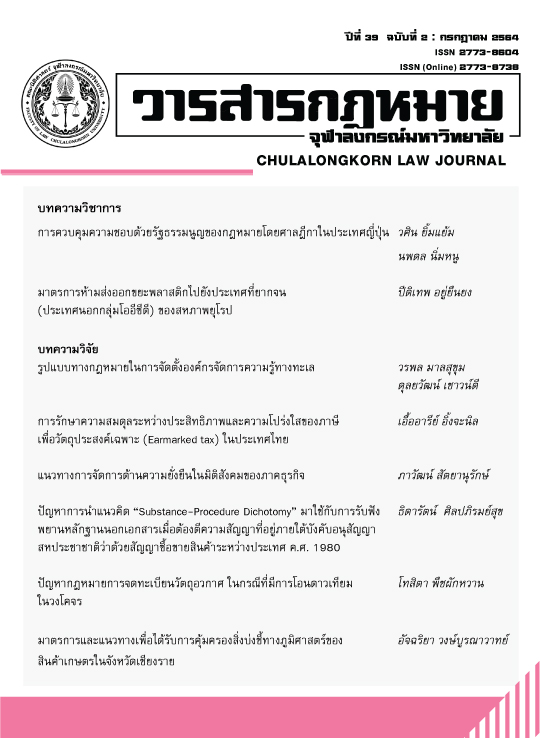ปัญหาการนำแนวคิด “Substance-Procedure Dichotomy” มาใช้กับ การรับฟังพยานหลักฐานนอกเอกสารเมื่อต้องตีความสัญญาที่อยู่ภายใต้ บังคับอนุสัญญาสหประชาชาติว่าด้วยสัญญาซื้อขายสินค้าระหว่างประเทศ ค.ศ. 1980
Main Article Content
บทคัดย่อ
อนุสัญญาสหประชาชาติว่าด้วยสัญญาซื้อขายสินค้าระหว่างประเทศ ค.ศ. 1980 (CISG) มีเจตนารมณ์
เพื่อลดอุปสรรคทางการค้าที่เกิดจากความแตกต่างของกฎหมายภายในประเทศ ผู้ประกอบธุรกิจการค้าระหว่าง
ประเทศจึงได้รับประโยชน์จากกฏหมายที่มีความเป็นสากลและถูกออกแบบโดยคำนึงถึงลักษณะพิเศษของการ
ซื้อขายสินค้าระหว่างประเทศโดยเฉพาะ อย่างไรก็ดี จากการทบทวนวรรณกรรมพบว่าแม้อนุสัญญาฯ
จะมีบทบัญญัติว่าด้วยหลักความเป็นเอกภาพภายใต้ข้อ 7. ปรากฏการณ์ที่นักวิชาการเรียกว่า “homeward
trend” อันขัดต่อเจตนารมณ์ของ CISG นั้น ยังคงปรากฏอยู่ในการตัดสินคดีของศาลภายในรัฐภาคีได้ โดย
อาจมีสาเหตุมาจากความคุ้นชินกับการนำแนวคิด“substance-procedure dichotomy” ซึ่งมีบทบาทสำคัญ
ในการพิจารณาคดีการค้าระหว่างประเทศที่อยู่ภายใต้กฎเกณฑ์ว่าด้วยการขัดกันแห่งกฎหมายตามปกตินั้น มาใช้ในการตัดสินคดีที่อยู่ภายใต้บังคับของอนุสัญญาฯโดยเฉพาะในกรณีที่บทบัญญัติเรื่องการตีความสัญญาภาย
ใต้ CISG ที่มักจะถูกวิเคราะห์ว่าเป็นกฏหมายสารบัญญํตินั้น อาจจะมีเนื้อหาที่ต่างจากหลักเกณฑ์เรื่องการรับ
ฟังพยานหลักฐานนอกเอกสารภายใต้กฏหมายภายในของรัฐภาคีได้ การศึกษาวิจัยนี้พบว่า การนำแนวคิด
“substance-procedure dichotomy” มาใช้ในบริบทของข้อพิพาทที่อยู่ภายใต้บังคับของอนุสัญญาโดย
ศาลภายในรัฐภาคีนั้น อาจทำให้เกิดปัญหาด้านความเป็นเอกภาพและประสิทธิภาพในการบังคับใช้อนุสัญญาฯ
ได้ จึงได้เสนอแนวทางเพื่อแก้ไขปัญหาดังกล่าว โดยการนำหลักการเรื่องพันธกรณีระหว่างประเทศมาปรับใช้ใน
กระบวนการพิจารณาคดีของศาลในรัฐภาคีแทนการใช้แนวคิดแบบดั้งเดิม ทั้งนี้ เพื่อให้การอำนวยความยุติธรรม
ของศาลในรัฐภาคีนั้นดำเนินไปได้อย่างสอดคล้องกับเจตนารมณ์สูงสุดของอนุสัญญาฯ
Article Details
ลิขสิทธิ์และเนื้อหาในเว็บไซต์ของวารสารกฎหมาย (รวมถึง โดยไม่จำกัดเฉพาะ เนื้อหา รหัสคอมพิวเตอร์ งานศิลป์ ภาพถ่าย รูปภาพ ดนตรีกรรม โสตทัศนวัสดุ) เป็นกรรมสิทธิ์ของวารสารกฎหมาย และผู้ได้รับการโอนสิทธิทุกราย
1. วารสารกฎหมาย ให้อนุญาตให้คุณใช้สิทธิอันไม่เฉพาะเจาะจงที่สามารถถูกถอนเมื่อใดก็ได้ โดยไม่มีค่าใช้จ่าย ในการ
- เยี่ยมชมเว็บไซต์และเอกสารในเว็บไซต์นี้ จากคอมพิวเตอร์หรือเครื่องมือสื่อสารผ่านเว็บบราวเซอร์
- คัดลอกและจัดเก็บเว็บไซต์และเอกสารในเว็บไซต์นี้บนลงคอมพิวเตอร์ของคุณผ่านระบบความจำ cache
- สั่งพิมพ์เอกสารจากเว็บไซต์นี้สำหรับการใช้ส่วนตัวของคุณ
- ผลงานที่ได้รับการตีพิมพ์โดยวารสารกฎหมาย จุฬาลงกรณ์มหาวิทยาลัย ถูกคุ้มครองภายใต้ Creative Commons Attribution 4.0 International License ซึ่งอนุญาตให้ทุกคนสามารถคัดลอก แจกจ่าย ดัดแปลง ส่งต่อ ผลงานได้ ก็ต่อเมื่อผลงานและแหล่งข้อมูลได้รับการอ้างอิงอย่างเหมาะสม
2. วารสารกฎหมาย จุฬาลงกรณ์มหาวิทยาลัย สงวนสิทธิ์ไม่อนุญาตให้คุณใช้สิทธิอื่นใดที่เกี่ยวข้องกับเว็บไซต์และเอกสารบนเว็บไซต์นี้ เช่น การคัดลอก ดัดแปลง เปลี่ยนแปลง ส่งต่อ ตีพิมพ์ แจกจ่าย เผยแพร่ จัดแสดงในที่สาธารณะ ไม่ว่าจะในรูปแบบใดก็ตาม ซึ่งเว็บไซต์หรือเอกสารบนเว็บไซต์ โดยไม่อ้างอิงถึงแหล่งข้อมูลหรือโดยไม่ได้รับอนุญาตเป็นลายลักษณ์อักษรจากวารสารกฎหมาย จุฬาลงกรณ์มหาวิทยาลัย
3. คุณอาจขออนุญาตที่จะใช้เอกสารอันมีลิขสิทธิ์บนเว็บไซต์นี้โดยการเขียนอีเมลล์มายัง journal@law.chula.ac.th
4. วารสารกฎหมาย จุฬาลงกรณ์มหาวิทยาลัย เข้มงวดกับการคุ้มครองลิขสิทธิ์อย่างมาก หากวารสารกฎหมาย จุฬาลงกรณ์มหาวิทยาลัยพบว่าคุณได้ใช้เอกสารอันมีลิขสิทธิ์บนเว็บไซต์นี้โดยไม่ถูกต้องตามการอนุญาตให้ใช้สิทธิ ดังที่กล่าวไปข้างต้น วารสารกฎหมาย จุฬาลงกรณ์มหาวิทยาลัยอาจดำเนินคดีตามกฎหมายต่อคุณได้ เพื่อเรียกร้องค่าเสียหายที่เป็นตัวเงินและคำขอชั่วคราวให้คุณหยุดการใช้เอกสารดังกล่าว ทั้งนี้ คุณอาจถูกสั่งให้ชดใช้ค่าใช้จ่ายใดๆ ที่เกี่ยวข้องกับการดำเนินการตามกฎหมายนี้
หากคุณพบเห็นการใช้เอกสารอันมีลิขสิทธิ์ของวารสารกฎหมาย จุฬาลงกรณ์มหาวิทยาลัย ที่ขัดหรืออาจขัดต่อการอนุญาตให้ใช้สิทธิดังที่ได้กล่าวไปข้างต้น โดยเชื่อว่าได้ละเมิดลิขสิทธิ์ของคุณหรือของผู้อื่น สามารถร้องเรียนมาได้ที่ journal@law.chula.ac.th


